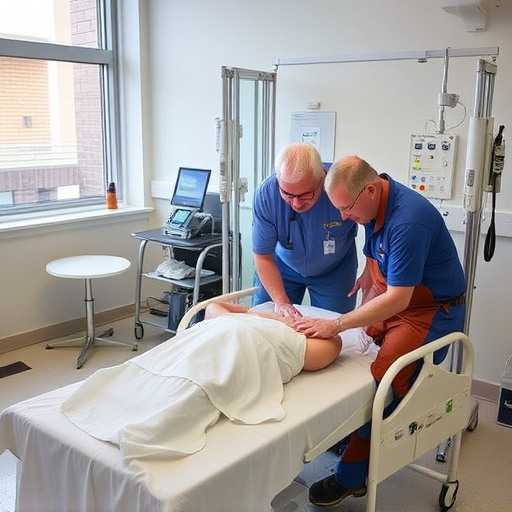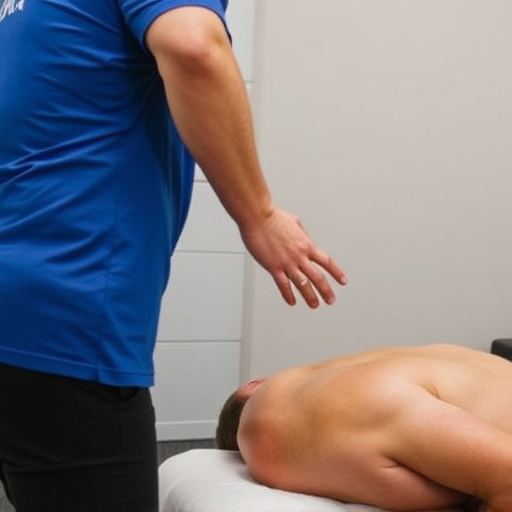Repetitive strain injury (RSI) is a common condition affecting physical and mental health through prolonged hand, arm, and upper limb strain. Chiropractic care and deep breathing exercises offer non-invasive RSI treatments, aiding recovery by restoring joint function, alleviating pressure, promoting relaxation, improving circulation, and reducing muscle tension. Breathing techniques, targeting the parasympathetic nervous system, are an effective adjunct to functional rehabilitation for improved RSI recovery outcomes.
Repetitive strain injury (RSI) is a common yet debilitating condition affecting millions, often caused by prolonged repetitive tasks. In this article, we explore breathing techniques that can significantly aid RSI recovery and alleviate symptoms. From understanding the impact of RSI to discovering the power of deep breathing and targeted exercises, these strategies offer natural relief, promote healing, and help prevent future strain.
- Understanding Repetitive Strain Injury and Its Impact
- Deep Breathing: A Powerful Tool for Relief
- Targeted Techniques for Strain-Specific Recovery
Understanding Repetitive Strain Injury and Its Impact

Repetitive Strain Injury (RSI) is a common condition affecting millions worldwide, particularly among those engaged in repetitive tasks with their hands and arms. It’s characterized by pain, discomfort, and potential nerve damage resulting from prolonged or repeated strain on the muscles, tendons, and nerves of the upper limbs. This injury isn’t just a nuisance; it can significantly impact daily life, work performance, and overall well-being. Individuals affected may experience difficulty performing simple tasks that were once effortless, leading to frustration and decreased quality of life.
The impact of RSI extends beyond physical discomfort. It can disrupt sleep patterns, cause stress, and affect mental health due to the constant pain and limited mobility. Post-accident rehabilitation plays a crucial role in managing and recovering from musculoskeletal injuries like RSI. Chiropractic care, for instance, offers non-invasive treatments focusing on restoring joint function and alleviating pressure on affected areas, which can significantly aid in RSI recovery.
Deep Breathing: A Powerful Tool for Relief

Deep breathing exercises have emerged as a powerful tool in the arsenal for managing and recovering from repetitive strain injuries (RSIs). By focusing on controlled inhalation and exhalation, individuals can experience significant relief from pain and inflammation associated with RSIs, such as carpal tunnel syndrome or tendinitis. This simple yet effective technique promotes relaxation, improves circulation, and reduces muscle tension, all of which are essential for a successful sports injury recovery or whiplash treatment.
In the context of personal injury chiropractic care, deep breathing can be a valuable adjunctive therapy. It helps patients regain control over their body’s stress response, thereby enhancing the overall healing process. By integrating these exercises into daily routines, individuals not only find respite from acute pain but also build resilience to prevent future RSIs.
Targeted Techniques for Strain-Specific Recovery

Breathing techniques are a targeted approach for managing and recovering from Repetitive Strain Injury (RSI), offering a strain-specific method to alleviate symptoms and support the healing process. By focusing on controlled breathing, individuals can activate their parasympathetic nervous system, which is responsible for promoting relaxation and reducing stress responses. This, in turn, helps to relieve muscle tension associated with RSI.
Personalized treatment plans that incorporate breathing exercises alongside other therapeutic modalities, such as functional rehabilitation, can lead to more effective recovery outcomes. These techniques encourage individuals to become aware of their breath patterns and learn how to adjust them during activities that aggravate the condition. Over time, this mindfulness can translate into improved muscle recovery and better overall function.
Breathing techniques offer a simple yet effective way to support the recovery process from repetitive strain injury (RSI). By incorporating deep breathing exercises and targeted respiratory methods, individuals can alleviate pain, reduce inflammation, and promote tissue healing. These practices not only provide immediate relief but also empower individuals to actively participate in their own RSI management, fostering a holistic approach to long-term recovery and improved well-being.














